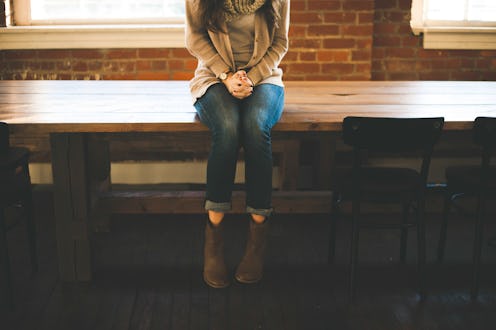Life
Why This Woman Had Her Period For 5 Years

By the fifth day of my period, I'm jealous of anyone who doesn't endure them and dreaming of menopause. For Chloe Christos, the Australian woman who had her period for five years, a regular five day period would have been a dream. When she first got her period at 14, it never stopped. She went on bleeding until she was 19 and was finally diagnosed with a bleeding disorder and put on medication that would change and save her life.
Why didn't she go to the doctor sooner, you ask? She was embarrassed. Whether we contribute to it or not, there's an international stigma attached to menstruation. Women have been raised to see their periods as private, personal matters that are meant to be kept discrete — for the sake of everyone else's comfort. While every woman should have the right to keep her menstruation private, she should also have the support and encouragement to allow it to be a non-shameful aspect of her life.
If Christos had felt safe and comfortable discussing her period, she wouldn't have spent five years suffering in secret. The disorder, Von Willebrand Disease, is a protein deficiency that inhibits clotting and causes bleeding. Not only did Christos suffer with finding the courage to seek treatment, but once she did, she found that on her many trips to the hospital (she had to receive blood transfusions for anemia, regularly), she was never treated with the same care and concern as male patients. It's as if every step of the way, her socially ingrained tendency to hide or belittle her issue was confirmed or validated by the reaction and response of the medical industry.
Christos was initially put on a synthetic drug that temporarily stopped the bleeding, but the terrible side effects rendered her life far too impaired to continue usage. One doctor was quick to suggest a hysterectomy, but as a young woman who has not explored her feelings and options for her future, she's understandably not ready to make such a decision.
Finally, directed to a hemophilia center and taken seriously, she's found a drug used for hemophiliacs that has actually worked. She now has a normal period and can live her life without limits. While it's amazing that this painful journey has landed her in a healthy and supported place, it's hard to ignore the amount of obstacles she had to go through — both mental and physical — to get the help she needed. If only she lived in a society where she was made to feel comfortable and confident seeking help at 14, she could have been taken seriously and properly diagnosed then, too.
And hopefully, the more we talk about women's health in the press, the further we can push it from its taboo status and into the light. Because as Lena Dunham so eloquently stated earlier this week at an endometriosis benefit, "Medical research is really misogynistic." Ten percent of women suffer from the same uterine disease as Dunham, but other diseases, that are not linked to the female reproductive system and affect far fewer people, receive more funding for research. We can sit around all day trying to figure out which came first, the stigma or the attitude about women's health, but the best use of our time and effort is to put our energy towards removing the shame that's lingered far too long around women's health.
Image: Pexel